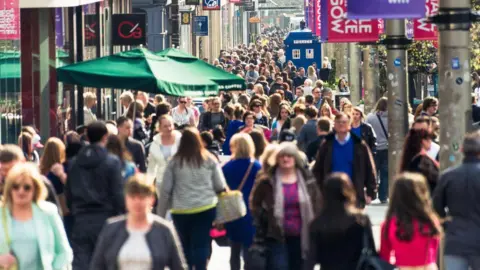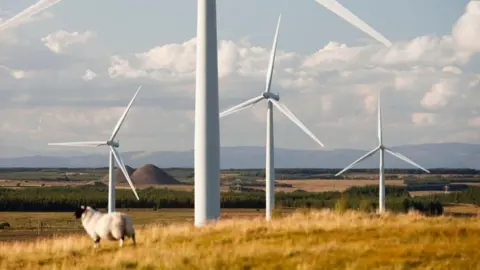How could politics shape the Scotland of 2050?
 Getty Images
Getty ImagesScotland's politicians are all pretty focused on 2026 right now, with a Holyrood election less than a year away.
But should they be concentrating on longer-term objectives - and what Scotland could look like in 2050?
A conference in Edinburgh invited leaders to think beyond the short-termism of the five-year electoral cycle.
And in an era where many voters feel politicians are all the same, perhaps we can learn more about their policies via their ultimate vision for the country.
Scotland and the world are likely to be largely unrecognisable by 2050.
Look back at the last 25 years and think about how the way we work, communicate, socialise and navigate our way through our lives has changed.
Technological advances are a massive part of this. At the turn of the millennium you had to ask your mum to get off the landline phone so you could use the dial-up modem.
Today the WiFi hub connected to every other item in the house is probably the only thing plugged into that phone line.
And that change is not slowing down - it is accelerating exponentially.
 Getty Images
Getty ImagesAlgorithms already help decide what we watch on TV, who we date, and what content scrolls through our social media feeds.
Is it so hard to imagine that in a few years' time they'll be driving our cars, diagnosing our illnesses and managing our financial markets?
Politicians are always very keen to talk about new technology; nobody wants to be left behind.
The Scottish government is going to set up its own AI agency to make sure innovations are shared across the public sector.
But is Scotland well placed to forge into a new digital future?
At Scotland 2050, Michael McLaughlin from legal firm Shoosmiths talked about a "massive skills gap" in technology.
He recently represented a company looking to hire 70 developers for a big tech project; they ended up finding 85% of them abroad.
He argues that politicians and the private sector need to "get round the table and decide what we want to be good at in 25 years' time" - to prioritise four or five sectors and encourage and train people to work in them.
Mairi Spowage from the Fraser of Allander Institute also urged leaders to focus on the economic strengths we already have - like financial services and world-class universities - rather than chasing fads.
Investment and economic growth
If there was one theme which came from the business leaders involved in the event, it was the need for consistency and policy certainty. Firms simply will not invest in jobs, infrastructure or training without it.
Fostering that investment and growing the economy is a priority shared by all political parties. But it is striking how different their approaches are to achieving it.
The SNP has long had big government at its heart, proudly championing universal allowances, interventions in the lives of citizens and in the market and higher taxes to pay for them.
By contrast the Conservatives are more keen to slim down the size of the state while cutting taxes and "red tape".
Meanwhile Scottish Labour leader Anas Sarwar popped up at the conference to argue for something in the middle - cutting taxes, but replacing that with income from economic growth which would maintain public spending.
Artificial intelligence is a key example of a buzzword field which politicians love to talk about, but which will need a concerted effort to use in a joined-up fashion.
The point about skills and focus is an important one, given finite resources - but the conference also heard that there are opportunities which could be grasped.
Sam Airey from German energy giant EnBW pointed out that Scotland produces more energy than it uses, but that the current state of the national grid makes it hard to transfer it down south.
Upgrading that infrastructure is a UK government priority, but Mr Airey suggested that Scotland could also look to house power-hungry AI data centres, which are best located in cold regions.
That could put us at the heart of an industry set for exponential growth - and the excess heat from the servers could even be funnelled to nearby homes and businesses.
 Getty Images
Getty ImagesUsing Scotland's potential for renewable energy production as a cornerstone of the economy of 2050 was also highlighted by John Swinney, with the first minister suggesting it could lead to cheaper food production as well as products being made closer to home.
He offered a vision of "energy rich Scotland meaning energy rich Scots".
Energy and climate more generally is certainly an area where the Scottish government has set ambitious goals - although it has also routinely fallen short of them.
Ministers insist they are still on track to reach net zero carbon emissions by 2045 - five years ahead of the UK government goal of 2050.
Moving on from fossil fuels will represent a seismic change - the oil industry still provides tens of thousands of jobs and billions of pounds of economic activity; household energy prices are set based on the price of gas.
It will have plenty of knock-on effects too, like the move to electric cars. The sale of new petrol and diesel vehicles is to be phased out by 2035, so by 2050 there will be next to none left on the road.
Scotland is well-placed to tap into alternative forms of energy, with a wealth of renewable potential from wind and wave power.
But this is still an area where there are stark differences in the vision of the future.
John Swinney's SNP is not quite the same party that declared a climate emergency and brought the Greens into government, but it is still clear that it is prioritising renewable energy.
However, detail beyond that is difficult to pin down, because the government has still not published its long-promised energy strategy.
Labour also has a clear goal of phasing out oil and gas, but is pushing for a bigger move towards nuclear energy - something the SNP oppose.
The Conservatives meanwhile have gone in the opposite direction, pushing opposition to the difficult trade-offs involved in the transition to net zero.
Population changes and the welfare bill
Something we can't ignore in all of this is that Scotland's population is going to look very different by 2050 too.
Helpfully the National Records of Scotland has projected forward to 2047, and thinks we are on track for modest population growth.
But the average age of Scots is projected to increase, with the number of people over 75 set to grow by 341,300, up against falls in the numbers under 15 (down by 79,900) and aged 16 to 29 (down by 57,300).
That puts increasing strain on the state, given current commitments to things like free personal care and the "triple lock" on pensions.
These are issues which are inextricably knitted into questions about our future economy and workforce - and which politicians are notoriously shy of grappling with, given older people reliably turn up to vote.
But with Holyrood's social security bill set to be £2bn higher than the block grant coming from Westminster by 2030, questions about how sustainable this is are unavoidable.
Jeane Freeman was the social security secretary who set up Scotland's devolved welfare agency, and even she says that governments - including the one she served in - "dodge the decision" about what the care system should look like and how it should be paid for.
She said governments of all stripes need to have "proper conversations" with voters about big issues - including things like the triple lock, which she said was "well worth a debate".
Ms Freeman also noted that the danger of short-term political promises is that increasingly, "people just don't believe them".
The death of democratic politics?
That feels particularly true for younger generations.
The conference reflected that many young people are finding it harder to make their way in the world than their parents' generation - from the job market to the housing emergency, to the constant scrutiny of social media.
Eddie Barnes, from the John Smith Centre, warned that some young people have so little optimism for the future that they are losing faith in democratic politics entirely.
His group recently ran a poll asking young people whether they would prefer dictatorship to democracy, and 27% of respondents chose dictatorship.
That's an extreme example, but it rings true after a decade where the defining political force in almost every corner of the world has been populism.
That is inherently linked to an era of exponential change - it is unsettling, and it leaves people grasping for answers.
If they feel the government of the day isn't delivering stability or certainty, it isn't surprising that dissatisfaction with institutions is growing - or that some are willing to throw votes behind those who promise to listen to them, and to shake things up.
John Swinney has certainly detected this mood; he talked about "listening to the public and addressing the strain they feel on the cost of living".
Over the longer term his answer, unsurprisingly enough, is independence.
Frankly we didn't learn anything new about the parties' positions during this conference - Swinney didn't offer any new insight on how the SNP might force the matter if its calls for a referendum continue to be blanked, for example.
But when we think again about how much things have changed over the last few decades - devolution, Brexit, five prime ministers in five years - and how much our unpredictable world is likely to change again by 2050, it's fair to conclude that just about anything is possible.
